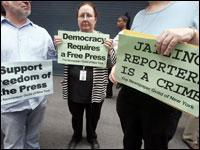Transcript
BOB GARFIELD:
From WNYC in New York, this is NPR's On the Media. I'm Bob Garfield.
BROOKE GLADSTONE:
And I'm Brooke Gladstone. For the first time in, let's see, 35 years, there's real movement towards a federal shield law that would allow reporters to protect their anonymous sources. House Speaker Nancy Pelosi reportedly will bring a bill that passed in committee last summer to the floor as early as Tuesday. And recently, the Senate Judiciary Committee passed a similar bill.
Journalists already have a legal right to protect their sources, in most states but, as Adam Liptak of The New York Times explains, "If Congress does craft a true national shield law, reporters will finally have won the privilege to protect sources in federal cases, as some other professionals do."
ADAM LIPTAK:
Those privileges, of priests, lawyers, doctors, psychotherapists, are quite well established and fairly strict, although they do have exceptions often. In the case of lawyers, it has an exception for crimes and frauds. And if you were to apply some of those exceptions to journalists, you might have real problems because very often the people who speak to us and whom we want to protect are violating a law by providing information to us.
BROOKE GLADSTONE:
But certainly journalists aren't calling for a blanket exemption from all legal proceedings, always, forever.
ADAM LIPTAK:
Not any more.
[LAUGHTER]
The press used to take a quite absolutist stand. In 1972, when the Supreme Court heard its only case on this subject, many news organizations said that only absolute protection will do. That's not the way we talk any more.
BROOKE GLADSTONE:
The 1972 case you referred to is Branzburg v. Hayes. It found that reporters had no First Amendment right to protect their sources. Now recently, you ran across some notes written by Justice Lewis Powell at the time. He's known for having written an ambiguous concurring opinion that is often used to argue that reporters, maybe because it's so vague, do, in fact, have a constitutional right to protect their sources.
ADAM LIPTAK:
These notes that just surfaced actually really clarify what Justice Powell meant to say. On the one hand, he says that the First Amendment, the Constitution, does not contain a reporter's privilege. But, he says, there's absolutely nothing wrong with judges, just as they have created lawyer/client and doctor/patient privileges, nothing wrong with them taking account of the special status that journalists have and the special role they play in balancing the interest in the free flow of information against the interest of getting every person's evidence into court.
And I should emphasize these notes have no legal force. No one can wave this around in court and say, I win. But they do clarify, and, in a funny way, anticipate where the law would find itself going 35 years later.
BROOKE GLADSTONE:
Thursday before last, the Senate Judiciary Committee passed a version of a national shield law. It's drawn mixed reviews. What do you think is the best thing about it and what do you think is the worst thing about it?
ADAM LIPTAK:
The best thing about it is that it exists. When you get a subpoena, you want to be able to go to court and start arguing. And today in federal court, very often the answer to an attempt to get rid of a subpoena is, sorry, you guys have no rights. So if all this does is start a conversation in front of a judge who will hear from journalists and balance the relevant interests, that's a big positive.
On the other hand, the bill is weak. And a lot of journalists are supporting it, but holding their noses. This is by far weaker than any of the state shield laws. It's much weaker even than the Justice Department's own guidelines.
BROOKE GLADSTONE:
But you think the Senate came to a pretty smart conclusion when it came to actually defining who a journalist is.
ADAM LIPTAK:
Right. It says that a journalist is someone who gathers and disseminates information of public interest on a regular basis. And if you do that, it doesn't matter if you're a blogger or a TV broadcaster or newspaper reporter.
BROOKE GLADSTONE:
There are a lot of people out there, and they aren't just in Congress or in the White House, who think that reporters have been engaged in an awful lot of special pleading lately.
ADAM LIPTAK:
You know, Brooke, if you think back at some of the greatest journalistic triumphs of the past couple of years - The Times’ reporting on the NSA surveillance, The Washington Post reporting on secret prisons - that reporting could not have been done without confidential sources. And I don't think any serious person disputes that those are incredibly important issues to bring forward for candid debate.
BROOKE GLADSTONE:
Thanks very much.
ADAM LIPTAK:
Thank you, Brooke.
BROOKE GLADSTONE:
Adam Liptak is the national legal correspondent for The New York Times.

